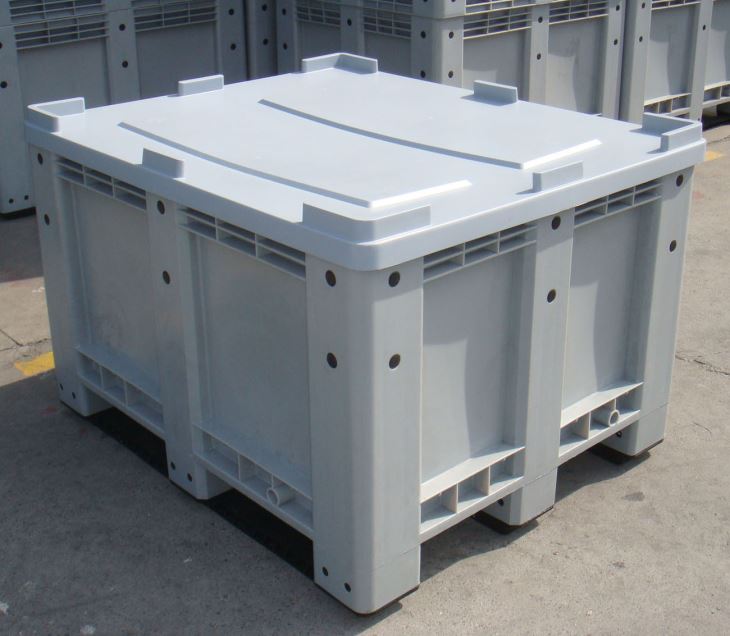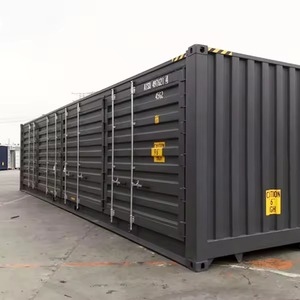Why Mass Containers Are Vital for Cost-efficient and lasting Transport
Bulk containers play an essential duty in modern-day logistics. They facilitate the effective activity of large quantities of goods, therefore maximizing transportation procedures. This approach not just lowers costs but additionally decreases environmental impact via reduced exhausts and waste generation. As sectors seek even more lasting methods, the fostering of bulk containers is ending up being significantly significant. What effects does this shift hold for future logistics and supply chain management?

The Benefits of Making Use Of Mass Containers in Logistics
Mass containers reinvent logistics by boosting performance and sustainability. These containers permit the transportation of huge amounts of goods in a solitary trip, considerably decreasing the number of journeys required. This not just streamlines procedures however additionally reduces labor expenses related to handling, packing, and unloading. Furthermore, bulk containers are created to enhance space utilization within transportation cars, making sure that more items can be shipped all at once.
The standardization of mass containers also streamlines the logistics process. With consistent dimensions, they can be easily stacked and kept, bring about enhanced storehouse management. Mass containers typically feature long lasting products that safeguard materials from damages during transit, thus decreasing product loss and raising overall dependability. Consequently, organizations can experience improved supply chain performance, inevitably bring about increased profitability and client fulfillment. This mix of factors makes mass containers an essential property in modern logistics.
Ecological Effect: Decreasing Waste and Carbon Footprint
As markets progressively focus on sustainability, the fostering of bulk containers has arised as a key method for lowering waste and lowering carbon footprints. These containers lessen the use of packaging products, such as boxes and plastic, thus notably decreasing general waste generation. By combining shipments, bulk containers enhance transport performance, enabling more products to be transferred per trip. This decrease in trips straight associates with lower greenhouse gas discharges, contributing to a smaller carbon footprint.
Moreover, mass containers can commonly be reused or recycled, even more reducing ecological effect. The durability of these containers assurances they can stand up to numerous transport cycles, minimizing the demand for single-use options. refurbished bulk containers. By simplifying logistics and promoting reliable resource usage, bulk containers not just sustain lasting methods yet likewise urge sectors to align with international ecological goals. Eventually, their application shows a dedication to eco-friendly stewardship and responsible resource monitoring
Expense Cost Savings: Just How Mass Containers Lower Transportation Costs
While numerous companies look for means to enhance their profits, the use of bulk containers offers a significant chance for reducing transportation expenses. Mass containers make the most of the volume of products carried, allowing companies to deliver larger quantities at the same time. This performance minimizes the number of journeys called for, directly reducing gas costs and minimizing labor costs connected with loading and discharging.
Furthermore, mass containers frequently include streamlined layouts that enhance room usage within transport cars. This implies less voids, resulting in a lot more effective usage of available capacity. The sturdiness of bulk containers can decrease the danger of item damage throughout transportation, reducing losses and making certain that even more products get here intact.
Enhancing Supply Chain Effectiveness With Bulk Storage Solutions
Bulk storage services play an essential role in improving supply chain efficiency by enhancing stock management. By consolidating items into fewer, bigger containers, companies can substantially reduce dealing with prices connected with frequent transfers and handling. This structured method permits for far better monitoring and management of stock, eventually bring about enhanced operational efficiency.
Streamlined Supply Management
Efficient stock administration is crucial for optimizing supply chain operations, particularly when companies embrace bulk storage space remedies. These remedies allow businesses to maintain greater stock levels while reducing the regularity of replenishment. By combining products into bulk containers, firms can improve their stock procedures, decreasing the intricacy connected with tracking numerous smaller packages. This strategy promotes accurate supply counts and boosts projecting accuracy, permitting more enlightened decision-making. On top of that, bulk storage space remedies simplify storehouse company, making it less complicated to situate and accessibility products when required. As a result, organizations can attain a more efficient stock turn over rate, inevitably enhancing overall supply chain efficiency and decreasing the possibility of stockouts or overstock scenarios.

Lowered Handling Prices
The execution of mass storage space remedies not just improves inventory administration yet likewise substantially lowers handling prices across the supply chain. By consolidating materials into bulk containers, companies minimize the demand for regular handling and transfer in between different storage space and transport devices. This method cuts down on labor prices connected with loading, discharging, and moving smaller plans. In addition, bulk storage decreases the regularity of shipments, causing reduced transportation costs and reduced fuel intake. Consequently, services can maximize their logistics procedures, enabling a more efficient allocation of sources. Inevitably, lowered handling expenses add to improved total supply chain performance, fostering an atmosphere that sustains both sustainability and financial viability.

Flexibility of Mass Containers Across Different Industries
Although several industries have distinctive needs for transport and storage space, mass containers have emerged as a functional service that meets a vast array of needs. These containers, varying from big containers to specialized storage tanks, can fit diverse products, including granules, liquids, and powders. In the agricultural field, mass containers promote the transportation of grains and plant foods, while the food and beverage industry uses them for components and ended up items. The chemical sector relies upon mass containers for safely transporting harmful materials, guaranteeing conformity with security laws. Furthermore, construction companies take advantage of mass containers for moving accumulations and other materials. Their flexibility includes different modes of transportation, consisting of ships, trains, and vehicles, enhancing logistical performance. This flexibility not just improves procedures throughout various fields but likewise promotes sustainability by decreasing packaging waste and maximizing area in transportation. Bulk containers play a vital function in contemporary supply chain management.
Future Fads in Bulk Container Use and Sustainability
The future of mass container usage is significantly formed by cutting-edge products advancement that boosts sustainability. Furthermore, automation in logistics assures to streamline procedures, reducing waste and enhancing efficiency. Welcoming round economic climate techniques will even more reinvent just how bulk containers are made, made use of, and reused, promoting a more lasting transportation landscape.
Innovative Materials Advancement
As industries increasingly focus on sustainability, cutting-edge products advancement in mass containers becomes a substantial consider boosting environment-friendly transport remedies. Manufacturers and researchers are discovering biodegradable plastics, recycled composites, and lightweight steels to minimize environmental influence. These materials not just reduce waste however additionally boost gas effectiveness by lowering the overall weight of containers. Additionally, innovations in wise materials, which can adjust to varying conditions, enhance the toughness and click this link capability of mass containers. The combination of these ingenious products straightens with round economy principles, promoting reuse and recycling. As visit site the demand for lasting techniques expands, the development of such products will certainly play a vital role in forming the future of mass container usage in logistics and transport.
Automation in Logistics
Considerable advancements in automation are positioned to transform logistics and the use of mass containers, boosting sustainability in transportation. Automated systems, consisting of drones and autonomous cars, are enhancing the activity of bulk containers, minimizing the reliance on conventional fuel-powered transportation. These innovations maximize routing and filling procedures, boosting and lessening empty miles gas effectiveness. In addition, automated stock monitoring systems enhance monitoring and monitoring of mass containers, making certain far better source appropriation and minimized waste. The combination of the Net of Points (IoT) enables real-time information analysis, enabling proactive decision-making that aligns with sustainability goals. As automation remains to evolve, it is anticipated to drive further developments in bulk container use, ultimately sustaining even more lasting logistics techniques and minimizing the ecological influence of transportation.
Circular Economic Climate Practices
Innovations in automation are setting the phase for a much more integrated strategy to circular economic situation techniques in the domain name of bulk container usage. As markets progressively welcome sustainability, mass containers are being created for longevity and reusability. This change not only minimizes waste yet also improves source performance. Business are taking on methods such as closed-loop systems, where made use of containers are gathered, reconditioned, and reestablished into the supply chain. Additionally, wise innovations track container life cycles, facilitating far better management and lowering ecological impact. The collaboration between makers, logistics companies, and end-users is vital in developing criteria for sustainable container use. used collapsible bulk containers. Future patterns indicate a growing emphasis on pop over to these guys materials that are recyclable and eco-friendly, more enhancing the round economic situation's principles in bulk transport

Often Asked Inquiries
What Products Are Bulk Containers Generally Made From?
Mass containers are usually created from long lasting materials such as high-density polyethylene, light weight aluminum, cardboard, and steel. These materials offer adaptability, toughness, and defense, making them appropriate for transporting various items in various markets efficiently.
Just how Do I Pick the Right Size Bulk Container?
Selecting the ideal size bulk container includes examining the volume of products to be transferred, considering handling tools compatibility, and evaluating storage room demands. Appropriate size guarantees effectiveness in transportation and reduces waste during delivery.
Are Mass Containers Reusable or Recyclable?
Bulk containers are typically recyclable, made for multiple journeys, improving sustainability. Several can likewise be recycled, depending on the products utilized. Picking recyclable alternatives additionally sustains ecological objectives and lowers waste in transportation techniques.
What Security Laws Relate To Mass Container Transport?
Safety and security guidelines for bulk container transport include compliance with the Department of Transportation guidelines, appropriate labeling of dangerous materials, architectural integrity evaluations, and adherence to weight restrictions to assure secure handling and stop mishaps throughout transportation.
How Can Companies Change to Utilizing Mass Containers Effectively?
Services can change to bulk containers by assessing existing logistics, educating team on handling, purchasing suitable equipment, enhancing stock management, and collaborating with vendors to ensure compatibility and effectiveness throughout the supply chain.
As markets increasingly focus on sustainability, the fostering of mass containers has actually arised as a key technique for lowering waste and decreasing carbon footprints. By settling products right into mass containers, companies can simplify their stock procedures, minimizing the complexity associated with tracking several smaller packages. As sectors significantly focus on sustainability, innovative materials advancement in mass containers emerges as a substantial variable in improving green transportation options. Automated systems, including drones and independent lorries, are simplifying the motion of bulk containers, lowering the reliance on standard fuel-powered transportation. In addition, automated supply management systems enhance tracking and surveillance of bulk containers, guaranteeing much better resource appropriation and minimized waste.